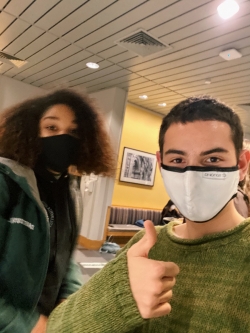

Owen Seiner


The Best of Both Worlds: First-Year Writing as a STEM Student
All freshmen at Dartmouth take at least two writing classes during their first year, consisting of either the two-term Writing 5 and First-Year Seminar combo or the three-term Writing 2-3 and a First Year Seminar sequence. As a student interested in STEM, I was a little apprehensive about taking such a writing and reading intensive course. However, the options for these writing courses truly embody the broad range of the liberal arts: students can take courses on any range of topics from those that take a more scientific approach to those that focus solely on literature and philosophy. Right now, I'm taking a Writing 5 class called Food for Thought, focusing on environmental, agricultural, culinary, and nutritional aspects of the food we choose to eat.
Throughout the class, we've delved into scientific, political, economic, and nutritional views on our food system and potential ways to improve it. On most days, we do some type of reading before getting to class—usually some type of research paper from a scientific journal, an opinion piece in a newspaper, or a poem/short story—and discuss it as a group, getting into interdisciplinary debates with students from a various academic backgrounds and using these class discussions to build our opinions for papers; I can't tell you how many times I've logged off Zoom with my mind completely changed. In terms of assignments, we've already written a personal narrative essay about our relationship with food and an analysis paper critiquing a new-age environmental food movement, and I'm now working on my final research paper on a topic of my choosing as well as a group project about vegan cuisine and misconceptions about it.

Looking forward to the winter term, when I'm taking my first-year seminar, I'm deciding between tons and tons of awesome options, ranging from psychoanalyzing Don Quixote to the philosophy of science. Right now, I'm thinking of taking a class called "Life on Mars" offered by the Earth Sciences department—which, honestly, sounds super cool—especially given my interest in studying biology.
All in all, writing at Dartmouth isn't nearly as intimidating as it seems. The class offerings are not only super interesting but also inclusive, and their discussion-based formats are so conducive to making friends. So, even if you've had a love-hate relationship with English and writing classes in high school, you can definitely start getting excited for your first year writing experience at Dartmouth!
Posts You Might Like

Read more to find out classes that I (as well as others) recommend!


After spending nearly an entire school year at Dartmouth, I want to revisit my "Why Dartmouth" supplemental essay. I want to explore all the new reasons why Dartmouth has become a place I can call home.


Learn a little about Dartmouth's Anthropology Foreign Study Program (FSP) in New Zealand through some awesome film photos!


After a week of interning, I took a mini-vacation in one of the best beach towns (I may be biased).


Read more for some tips and tricks about your upcoming journey in college!


Winter is a term that most people spend cozy and indoors. My winter quarter, however, was full of amazing outdoor experiences, mostly through one of my classes! Here's the scoop on BIOL 061: Winter Ecology.


Keep up with my summer adventures and see how I am liking my LSA in Beijing so far!


The rumors are true, guys: engineering is hard. It took some adapting for me to find my pace and excel in the major. But, that was only possible due to the kind words of a Dartmouth professor.


Read on about my full time neuroscience research and the challenges of managing a Greek House.
